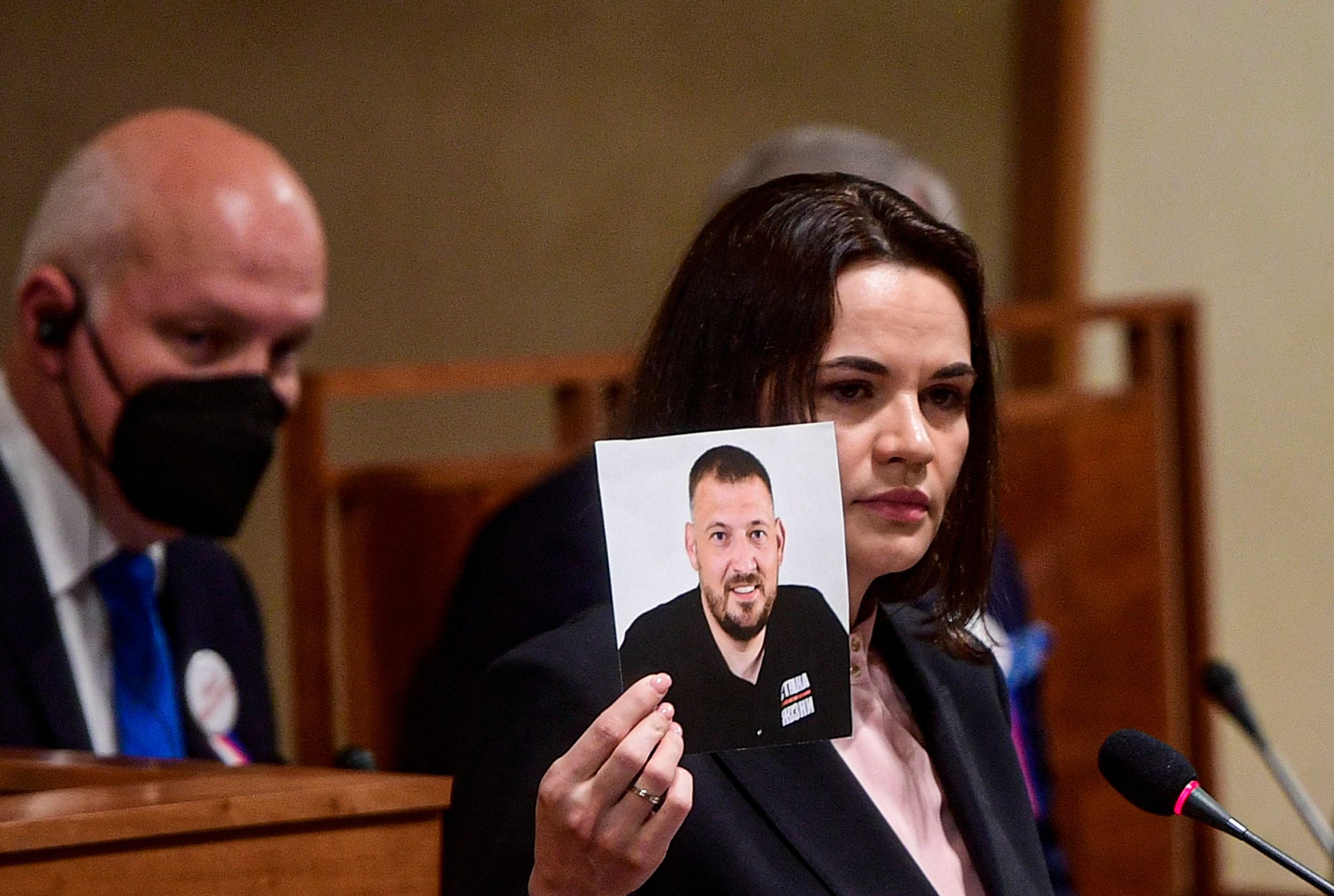‘Revenge’: Husband of Belarus opposition leader jailed for 18 years
Syarhei Tsikhanouski will serve his sentence in a ‘maximum security colony’

The husband of Belarus’s prominent opposition leader Sviatlana Tsikhanouskaya has been sentenced to 18 years in a “maximum security colony” for organising mass unrest and inciting social hatred, a move widely seen as a retaliatory step by the country’s president Alexander Lukashenko.
Syarhei Tsikhanouski, a YouTuber who attempted to run against Lukashenko in last year’s elections before being jailed as his popularity grew, heard his fate at the Gomel regional court in the country’s southeast. He denied the charges.
His wife, who lives in exile in neighbouring Lithuania with the couple’s two children, said the verdict was “revenge” on Lukashenko’s “strongest opponents” and pledged to keep going in her mission to unseat the 67-year-old, who has ruled Belarus since 1994, Europe’s longest-serving president.
Alongside Mr Tsikhanouski his allies Mikalai Statkevich, Ihar Losik, Artsyom Sakau, Uladzimir Tsyhanovich and Dzmitry Popau were also handed down prison terms ranging from 14 to 16 years. Tuesday’s sentencing marks the end of a 173-day closed trial.
“This is a farce. It’s Lukashenko’s revenge on Syarhei because he was brave, stood up to him and got the support of the people,” Franak Viačorka, a senior advisor to Sviatlana Tsikhanouskaya and family friend, told The Independent.
“This is also a tool to threaten Sviatlana. Lukashenko has been trying to use Syarhei’s imprisonment to keep her quiet, but he has failed on that front as well.”
Speaking to state media after the proceedings, prosecutor Denis Mikushev implied the court had shown leniency to Mr Tsikhanouski by giving him less than the full term of 20 years. It also came to light that the defendants were fined 2.5 million Belarusian Rubles (£744,000) for “material damage caused by crimes”.
When Mr Tsikhanouski was jailed in May 2020 before the August presidential elections, his wife Sviatlana, a schoolteacher, ran in his place. Despite having no political experience Ms Tsikhanouskaya proved a formidable opponent and grew in popularity across the country, appealing to vast swathes of the country who had grown tired of Lukashenko’s erratic rule.
When the president announced he had won the elections with 80 per cent of the vote, Belarusians of all ages took to the streets in protest for weeks while the opposition claimed victory. The EU, which does not recognise the result of the disputed presidential elections, has imposed sanctions on Belarus since October 2020.
In a recent interview with the BBC, Mr Lukashenko admitted that “people were beaten in the Okrestina detention centre” during the protests. He also signalled that he had no plans to reach out to the opposition, which has been forced to flee to Lithuania.
“As soon as [Russian President Vladimir] Putin sits down for talks with Alexei Navalny then I will instantly meet Sviatlana Tsikhanouskaya for talks… Putin will never get around the negotiating table with him,” he said.
Mr Viačorka said that despite the latest setback for the Belarusian opposition he believed pressure was mounting on Lukashenko.
“I think we [the opposition] are in a much better place than we were before Spring. Lukashenko has made one mistake after another. It’s clear he is losing his grip and right now I think it’s a matter of months, not years, before the regime falls.”
This autumn Lukashenko orchestrated a migration crisis on Belarus’s border with the EU in response to sanctions.
In early November thousands of people were trapped between Belarus and the EU as Polish, Lithuanian and Latvian border guards refused to let people cross and claim asylum. All three member states engaged in pushbacks.
Hundreds have since been repatriated but several remain in Belarus hoping to cross into the EU before the depths of winter arrive.
Subscribe to Independent Premium to bookmark this article
Want to bookmark your favourite articles and stories to read or reference later? Start your Independent Premium subscription today.

Join our commenting forum
Join thought-provoking conversations, follow other Independent readers and see their replies